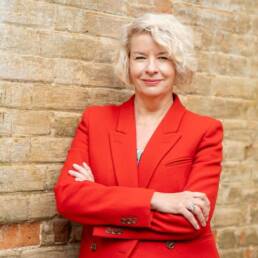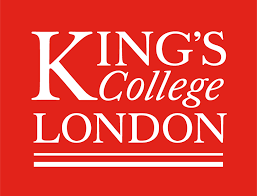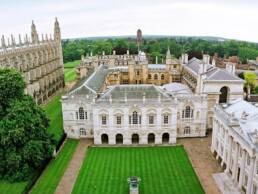
W100 Representative
Tania Rhodes-TaylorExecutive Director, Communications and External Affairs
Tania Rhodes-Taylor is Executive Director of Communications and External Affairs at King’s College London. She has worked in Higher Education since 2007, previously holding senior positions at the University of Sydney, Queen Mary University of London (QMUL) and the Institute of Education, UCL. This followed a successful career in the corporate and charity sectors which included the National Literacy Trust and Unisys. Having worked in Australia, Hong Kong and the USA, she always brings an international perspective to her work. Tania is also a qualified and accredited Executive Coach.

King’s College London is one of the top 25 universities in the world (2016/17 QS World University Rankings) and among the oldest in England. King’s has more than 29,600 students (of whom 11,750 are postgraduate students) from 150 countries worldwide and nearly 8,000 staff members. The university is in the second phase of a £1 billion redevelopment programme which is transforming its estate.
The Latest from King's College London
Children should not be strip searched or detained in police custody unless circumstances are truly exceptional.
These are some of the recommendations from an inquiry led by Dr @BevanMiranda @KCL_Law, presented at an event in Parliament today.
More ⬇️

Tighter laws needed for detaining and strip searching children in police custody
Children should not be detained in police custody unless they are arrested for a serious crime – and they shou...
www.kcl.ac.uk
The government has won a vote to reform the UK welfare system despite strong pushback from MPs on disability cuts.
However Prof Kim Hoque, Professor in Human Resource Management @kingsbschool, says some of the less widely reported reforms could benefit staff and employers ⬇️
Ahead of the new #JurassicWorldRebirth movie roaring into cinemas, we asked: what can Komodo dragons teach us about how dinosaurs killed and ate their prey?🦖
Learn more about Dr Aaron LeBlanc’s (@kingsdentistry) research.
#ScienceAtKings #KingsQs 🧵⬇️
“They are our best window into how these teeth are used to cut and tear into their prey.”
The temperature looks set to rise again this weekend – but can we trust sunscreen trends on social media? ☀️
We spoke to Professor of Experimental Photobiology Prof. Antony Young to sort fact from fiction and help us stay safe in the sun.
#KingsQs 🧵⬇️
Do any hacks on TikTok - like mixing sunscreen with foundation - reduce how well it works?
"This is a bad idea. Sunscreens are complex formulations and mixing with other ingredients will reduce the SPF at best and could de-stabilise the formulation to make it less effective."
Is expired sunscreen dangerous or less effective?
"It’s not dangerous. I think if stored at room temperature sunscreens will last longer than expiry date. The bottle may need a shake."
The FB has now expanded beyond Zimbabwe; it is being used in Malawi and Zanzibar, and it has been adapted for New York City, highlighting how interventions like this can be adapted to support different communities around the world.
These grandmothers are community volunteers, without any prior medical or mental health experience, who are trained to counsel patients usually for six structured 45-minute sessions, on wooden benches within the grounds of clinics in a discrete area.
Uniquely, the FB uses ‘grandmothers’ to deliver the therapy.
The FB intervention uses a cognitive behavioural therapy-based approach at primary care level to address 'kufungisisa' – the local word closest to depression (literally, “thinking too much” in Shona).
How can a simple wooden bench and the wisdom of grandmothers help to solve the mental health treatment gap? 🧠🪑
The Friendship Bench project is reshaping how communities deliver mental health support.
#WellbeingWeek
#KingsQs 🧵⬇️
What have been the outcomes so far?
As of September 2024 (2021-2024), 674,437 people have received treatment from the Friendship Bench.
Since June 2024 (2021-2024) 2,000 community health workers have been trained & there was a 78% reduction in depression & suicide ideation.
King's College London is the fourth oldest university in England
King's has over 31,000 students (including more than 12,800 postgraduates) from some 150 countries, and over 8,500 staff
The university is in the top seven UK universities for research earnings and has an overall annual income of just over £778 million
A nobel distinction
The highest distinction for academics of most disciplines is the award of a Nobel Prize, 12 people who have worked or studied at King’s and its constituent institutions have achieved this distinction. This includes; 2013 Nobel Prize for Chemistry jointly awarded to Professor Michael Levitt FRS, for the development of multiscale models for complex chemical systems. Michael Levitt studied physics at King’s and graduated with a Bachelor of Science degree in 1967 and the 2010.
Nobel Prize for Literature awarded to Mario Vargas Llosa who was Spanish American Literature in the Department of Spanish & Spanish-American Studies at King’s in 1969-70, and became a Fellow of King’s in 2005.
Mission and vision
- To educate
- To challenge
- To change
- Our vision is to educate responsible leaders who create positive, sustainable change in business and wider society
Ranked in the top 10 of UK universities
31,000
King's Students
£778m
Annual income
King’s has an outstanding reputation for world-class teaching and cutting-edge research. In the 2014 Research Excellence Framework (REF) King’s was ranked 6th nationally in the ‘power’ ranking, which takes into account both the quality and quantity of research activity, and 7th for quality according to Times Higher Education rankings.
King’s has a particularly distinguished reputation in the humanities, law, the sciences (including a wide range of health areas such as psychiatry, medicine, nursing and dentistry) and social sciences including international affairs. It has played a major role in many of the advances that have shaped modern life, such as the discovery of the structure of DNA and research that led to the development of radio, television, mobile phones and radar.
King’s is a world-leading institution with a truly global perspective. It has:
- Over 200 partnerships and innovative collaborations with leading universities and institutions across the globe, including key relationships with the University of California, San Francisco; the University of Hong Kong and the National University of Singapore.
- Joint PhD programmes, involving more than 20 academic departments across King’s, with institution including the University of Hong Kong and the National University of Singapore.
- Offices in Brazil, China, India, and the USA: part of a global network that will develop deeper relationships with local research, commercial, student and alumni communities in these key countries and regions.
- A School of Global Affairs comprising a network of Global Institutes to promote understanding of fast-changing parts of the world and encourage engagement with 21st-century powers. These include King’s Brazil Institute; the Lau China Institute; King’s India Institute; the Institute of North American Studies; King’s Russia Institute; King’s African Leadership Centre, and King’s International Development Institute.
Cultural competency & a global problem-solving mindset.

Become a Member
The World 100 Reputation Network is a group of the best universities in the world, delivering research that enhances reputation and offering leaders the chance to develop their own careers on a global stage. Members benefit from events and study tours, training, monthly media monitoring, and unique reputation research to provide institutional advantage.

